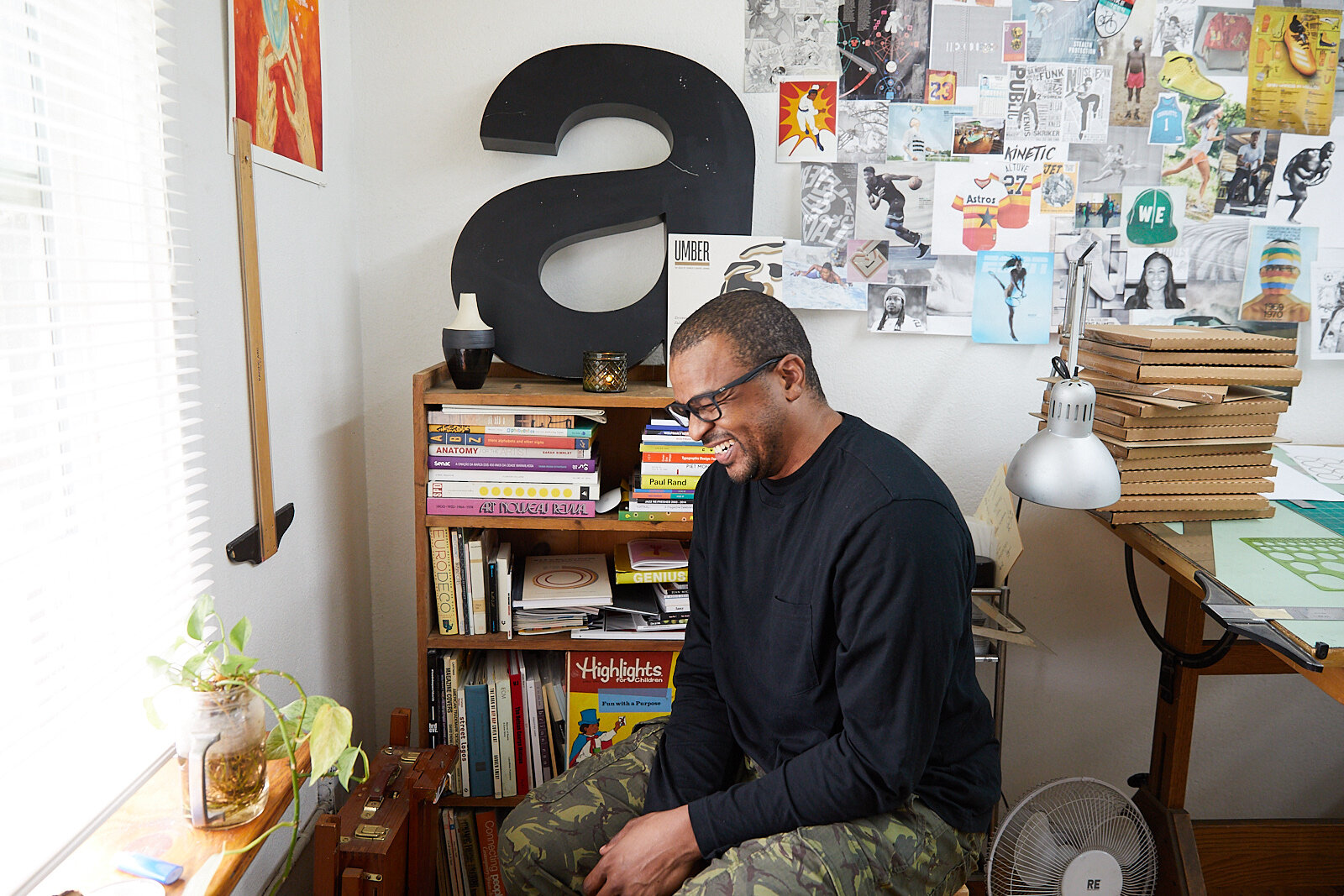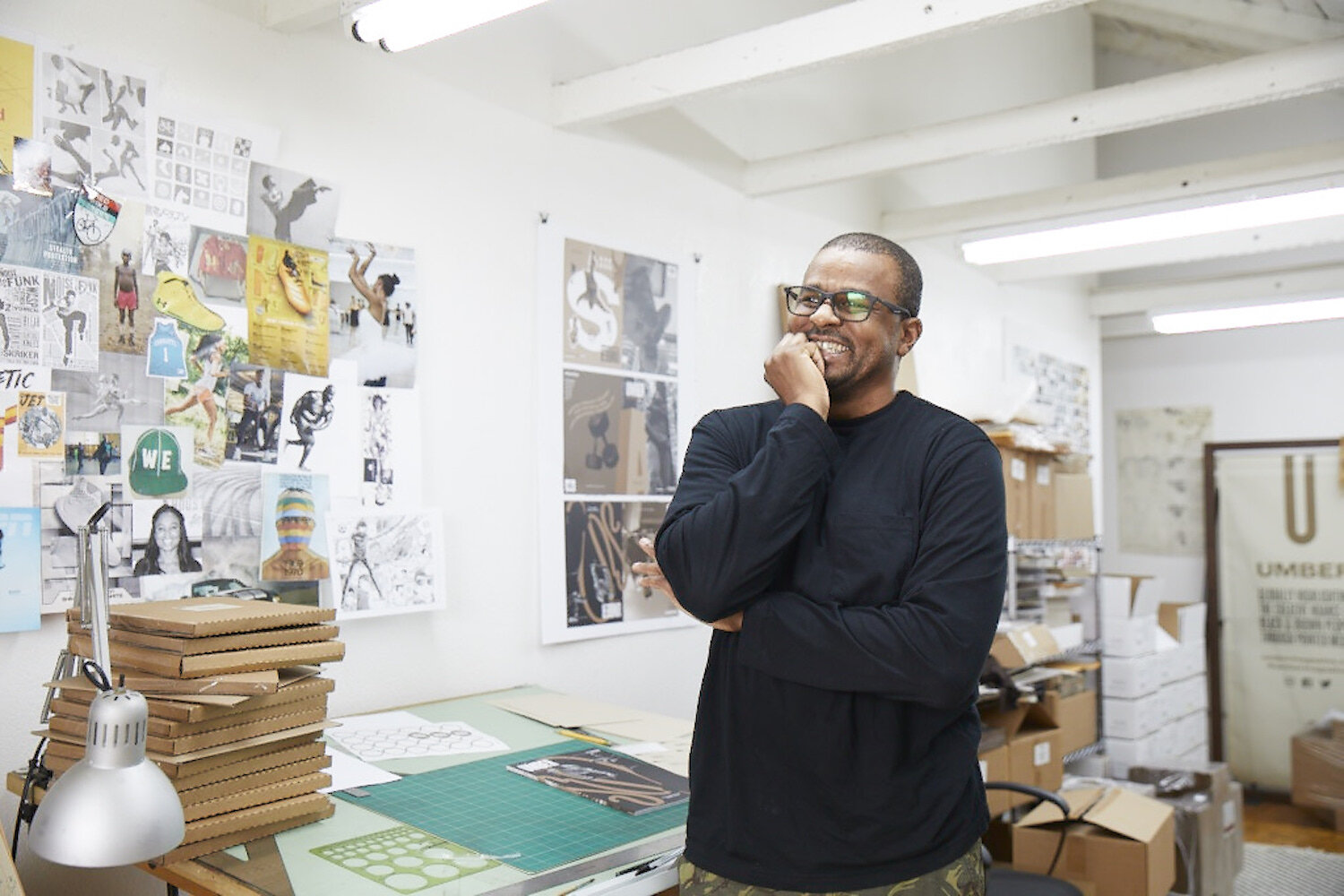Here For The Nerd
Mike Nicholls is bringing the geeks of Black and Brown communities into their own creative space with UMBER.
Mike Nicholls in his studio, photographed by Jen Siska.
“Does anybody else geek out about tiny little things like Helvetica?” asks Mike Nicholls, founder and creative director of UMBER, a graphic journal produced in Oakland, and self-described nerd. “I dream about it in my sleep. I literally dream about Helvetica in my sleep. I was going to move to Switzerland for Helvetica. Because it was made there in 1957.”
Nicholls loves nerds. He describes them as people who are passionate to the point of obsession. One of his obsessions, as a graphic designer by trade, is Helvetica. “The history of it, right, and so to the point where like you get lost in its beauty, you get lost in how it’s formulated so much to the point where like, I want to participate. I want to be part of this thing that I'm fascinated about,” says Nicholls.
Nicholls himself is a nerd for graphic design. “Even when I was younger, like I would design, not knowing it was called design or not knowing it was called illustration. I would design motorcycles just because I love motorcycles. I would get issues of—I think it was called Cycle World,” says Nicholls. “I would get the magazine and redesign the motorcycles.” It wasn’t until his senior year of high school when he met a representative from an arts center in Atlanta who told him about a career called graphic design.
“Does anybody else geek out about tiny little things like Helvetica? I dream about it in my sleep. I literally dream about Helvetica in my sleep.”
“I'm like, oh, oh shit, I think I've been doing it my whole life. So for me, nerd just means that you're so excited by this thing...you're so excited about it and that you want to participate in it.” Which is how UMBER came about. The print-only quarterly portfolio is a collection of Nicholls’ works of graphic design combined with the things he is “nerding out” about. “Plain and simple, it’s to highlight the creative nuances of Black & Brown (BIPOC) people in print media,’” Nicholls says about UMBER. “If you look at the world differently, if you engage with the world differently, and you look at it not just for what you see, but beyond, I call that the creative nuance.”
UMBER is built in Oakland but represents the point of view of communities globally, according to Nicholls. On a mission to find and display the creativity of Black and Brown nerds, in the past few issues Nicholls has explored themes like sports, music, and relationships. He thinks that UMBER offers Black and Brown creatives a unique space to not have to fit into a mold. “So you don't have to say, ‘Oh, as a Black woman, I’m really passionate about...,’ you can go right into what you're into because you're speaking within your community. ‘Oh, as far as a Native American I...’ No, just go right into what you want to, you know what I'm saying?” says Nicholls. “And just have that space to just be your authentic self and geek out.”
But don’t call UMBER a magazine, says Nicholls. “When I started, UMBER was a magazine. Right. But the tagline was ‘the creative thinkers’ graphic journal,’” he explains. “The history of the word magazine means a container or storage, and originally when magazines were created back in, almost 500 years ago now, it was made to sell advertising,” Nicholls continues. “UMBER is really the creative thinker’s graphic journal, meaning that is for the people who just think and deal with the world differently.”
“Plain and simple, it’s to highlight the creative nuances of Black & Brown people in print media. If you look at the world differently, if you engage with the world differently, and you look at it not just for what you see, but beyond, I call that the creative nuance.”
“UMBER has been in my head since ‘06,” says Nicholls. He moved to San Jose, California in 2007 and UMBER stayed on his mind. When he moved to Oakland in 2008, he started visiting a magazine shop, which is now permanently closed, called Issues Shop on Piedmont Ave in Oakland. It was there where he saw what print could be, and was inspired to turn UMBER into a graphic journal. In 2012, Nicholls released a prototype of UMBER that he just gave to friends and family. It was his passion project. But a few years later, it became something more.
“In 2016, Trump got elected,” says Nicholls, “I said alright, what am I going to do about this?” Nicholls doesn’t consider himself to be an activist as such. He believes those working in policy and on the front lines deserve the recognition as activists. “I decided to really push UMBER when Trump got elected. That was my way of protest. Let me be authentic in who I am and show up and take up space in what I believe in, for what I'm passionate in. My art has been my way of a protest, and so, I would never claim to be an activist, but I know that the work that I am doing to make art—even particularly in this time frame– to make art in this moment we are in now is a form of protest and activism.”
In 2017, he launched a Kickstarter campaign to fund the production of UMBER. That same year, UMBER was printed, and Nicholls decided to leave his full-time job as a graphic designer to dedicate himself fully to UMBER and his design practice. It’s been easy to stay dedicated to UMBER—it’s his dream realized, and he’s constantly drawing from his passion for the content that he and his fellow contributors are producing. He has never felt that way about any job he had in the past.
“What you're passionate about, that should be a portfolio. Do that nerdy thing that you love and and just design the hell out of that,” says Nicholls. “I treat UMBER as my canvas, as a designer, as a creative, as the illustrator. I just love laying out things, putting things together in puzzle pieces.” Nicholls is especially excited for the brand new issue of UMBER, which features an Indigenous artist. “This father and son team out of San Carlos, Arizona, on Apache reservation, created Apache Skateboards. The dad is a visual artist and his son is a pro skater.” says Nicholls. “He saw his son was into skateboarding. So he started designing the skateboard decks for his son as a way of honoring him. And so they’re featured in this issue. And that to me was so important, to have representation. Black folks we definitely get it, but the Native Americans, lord have mercy. They really got it hard.”
“I decided to really push UMBER when Trump got elected. That was my way of protest. Let me be authentic in who I am and show up and take up space in what I believe in, for what I'm passionate in. My art has been my way of a protest.”
Nicholls personally knows all his contributors. He follows artists on Instagram, and meets them at pop-ups, release parties or zine fests. It’s all part of building a community. This separates UMBER from other publications, according to Nicholls. “Behind every contributor is a story of how we met,” says Nicholls. These are folks we have a relationship with, even if it’s not a deep relationship. There’s common interest and values and perspectives are shared. That’s really how the contributors come into play.”
This year’s events—the high-profile murders of George Floyd, Breonna Taylor, and so many others by the police—and the mainstream coverage of the Black Lives Matter movement has created a whole range of emotions for Nicholls. “This is interesting because it’s like trying to convince someone of what you’re going through—now the whole world knows what you're going through, right?” says Nicholls.
He says that it puts a pressure on Black people that wasn’t there before. “There's a point where now you're known for that one thing.” says Nicholls. “You're known for the violence that is put on you on a day-to-day basis, versus you as a human. You're known for that trauma, that tragedy. And you don't want to be always known for that.”
“There's a point where now you're known for that one thing. You're known for the violence that is put on you on a day-to-day basis, versus you as a human. You're known for that trauma, that tragedy. And you don't want to be always known for that.”
Nicholls describes it as walking around with an open wound, with everybody picking on it. Instead of non-Black allies asking Black people how they are doing, Nicholls wants people to go into their own communities and start their efforts there. He wants non-Black people to allow Black people to heal from the inside of their community and put their money and your energy into helping from the outside. “I think it's one of those things where it's, you know, it further reminded me that I'm doing what I should be doing, to keep doing what I'm doing.”
The theme of the current issue of UMBER is sports, athletics, and movement. When the news brought Black Lives Matter to the forefront, Nicholls was asked if he would change the theme. But he doesn’t think that covering tragedy is the point of UMBER. As he always does, he let the creativity flow where it would, and just by nature of being the product of Black and Brown contributors, the issue ended up incorporating themes of the pandemic and Black Lives Matter. It was the natural flow conversation of the contributors about these issues that made it special, according to Nicholls.
“What I'm doing now is something I've always done,” says Nicholls. “I stayed with my convictions and what I believed in and I just took a chance and a risk putting it out there. And I know that I represent a larger community that's bigger than me. But at the same time, I have my own voice, my own authentic perspective on life. I really just decided how I want to take up space.”
Mike Nicholls in his studio, photographed by Jen Siska.






